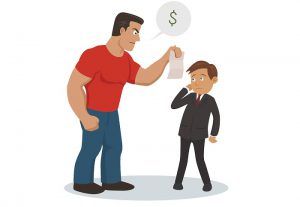Stuff happens. Sometimes, through bad planning, circumstance or whatever, we get behind on our bills. If we don’t fix the situation right away, we can expect the debt collectors to start calling eventually. When that happens, there are some things you need to know to avoid making the situation any worse.
First Party Versus Third Party Debt Collectors
The first thing you need to know when dealing with someone who is trying to collect a debt is: who are they? Are they the original creditor, such as the credit card company, service provider or store that granted you the credit? If so, that makes them the “first party debt collector.” When dealing with a first party debt collector, you don’t have many rights. You owe them money, they have to ask for it. They have the concern of keeping you as a customer so usually their dealings are fairly business-like and non-threatening. You may remedy this situation and be their customer again so they don’t  want to completely alienate you. Your opinion matters to them. Unsolicited advice: try to work it out with the original creditor if you can.
want to completely alienate you. Your opinion matters to them. Unsolicited advice: try to work it out with the original creditor if you can.
However, when the original creditor can’t collect they debt, they sell the account to a third party debt collector. That third party (remember, you the consumer are the second party in this transaction) collector is solely focused on collecting the debt. Their success keeps their business in business. Keep in mind, they bought that debt from the first party at pennies on the dollar. Whatever they can collect over what they paid is their profit. Their ability to collect establishes their reputation and standing within their industry. Bottom line, they are highly motivated to collect your debt. This motivation can spur some bad behavior, un-called for and un-business-like behavior. You are not their customer and they don’t have to be nice to keep your business. This situation is bad for consumers.
Fair Debt Collection Practices Act
Because of the increasingly bad behavior exhibited by some debt collectors, the Fair Debt Collection Practices Act (FDCPA) was established and then amended in 1986 to include attorneys who collect debts. The FDCPA outlines just how and when a debt collector can contact a debtor. The act governs their behavior since the market does not. When you are facing a debt collector, know your rights! Some of these third party debt collectors count on consumer’s lack of awareness and break the law. If you know they are breaking the law and you file a complaint, you can be awarded funds to compensate for actual damages, statutory damages and court costs! We Floridians are fortunate to have state-enacted similar legislation that puts addition al layer of restrictions on both first and third party debt collectors.

Since the bad practices used are so varied and the FDCPA is pretty specific, there are more details to this act than I have space to go into here. So – if you want to know more about your rights under the FDCPA, join me at the Lakewood Park Branch Library on Wednesday, 18 at 6pm and we will go over it all there! I would really prefer to answer your specific questions in person, but if you can’t join me on July 18, give me a call or email to request information. The ultimate goal is for us consumers to unite and show these third party debt collectors that we won’t stand for harassment and threats, so I will do my best to make sure you are armed with the proper tools to fight for your rights.
 0
0
